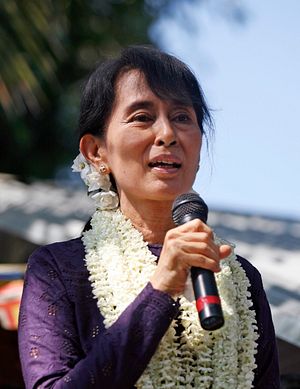In an unprecedented move, Myanmar’s reformist president, Thein Sein, flanked by several military leaders, including military chief Min Aung Hlaing, took part in talks with Myanmar’s opposition leader and prominent pro-democracy activist Aung San Suu Kyi on Friday. The talks were the first time Suu Kyi and Min Aung Hlaing met and represent a potential move towards deliberative democracy after years of military rule. The country will head to the polls in 2015 to elect a new government after years of gradual political reform under Thein Sein. Myanmar has been under direct rule by a military junta for nearly 50 years.
The meeting between Thein Sein and Suu Kyi comes on the heels of U.S. President Barack Obama calling for “inclusive and credible” elections in Myanmar during separate phone calls with the two politicians. Obama will visit Myanmar for the East Asia Summit in mid-November, and used his phone call with Thein Sein to stress the importance of addressing the deteriorating humanitarian situation facing Myanmar’s minority Muslims in the country’s western state of Rakhine. Myanmar’s Rakhine State has been gripped by communal violence between ethnic Rakhine Buddhists and Rohingya Muslims, resulting in 200 deaths and over 14,000 internally displaced people.
So far, few details have been released about the substance of Thein Sein and Suu Kyi’s meeting, but they are likely to broadly focus on the country’s political reform process. Regardless, the mere fact that Suu Kyi is being included in talks with the current president before the election speaks to the extent to which the upcoming 2015 elections may represent the first mature democratic elections in Myanmar. During the last general election in 2010, there were widespread accusations of electoral fraud orchestrated by the Union Solidarity and Development Party (USDP, Thein Sein’s party). Suu Kyi was still under house arrest then, and her party — the National League for Democracy (NLD) — was excluded entirely.
Suu Kyi remains ineligible to run for the presidency due to a constitutional provision barring candidates with foreign spouses or children running for the presidency; her late husband and son are both British citizens. The NLD continues to seek a constitutional amendment to change this provision in the interest of having Suu Kyi contest the presidency. Suu Kyi has publicly declared her interest in running for the presidency. She will likely push the issue of a constitutional amendment with Thein Sein. Myanmar’s general election remains a year away and is expected to take place in late October or early November 2015.
Suu Kyi, who is a member of parliament after her party won a majority of the contested seats in the 2012 by-elections, will almost certainly play a major role in the post-election scenario in 2015. According to most predictions, the NLD is expected to win a significant number of seats in the legislature. Thein Sein himself confirmed late last year that he would not stand for election in 2015. Instead, Shwe Mann will run as the candidate for the USDP.
According to the Associated Press, critics of the talks claim that they represent an attempt by the government to put up appearances of democratic progress ahead of the East Asia Summit in less than a month. Details of what was covered in the talks are expected to emerge over the next day.
































